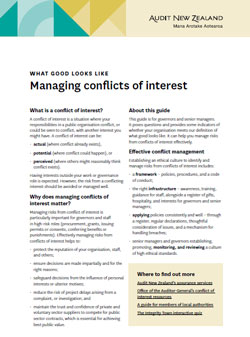Managing conflicts of interest
This is part of our series on What good looks like, produced by our Specialist Audit and Assurance Services team.
 What is a conflict of interest?
What is a conflict of interest?
A conflict of interest is a situation where your responsibilities in a public organisation conflict, or could be seen to conflict, with another interest you might have. A conflict of interest can be:
- actual (where conflict already exists),
- potential (where conflict could happen), or
- perceived (where others might reasonably think conflict exists).
Having interests outside your work or governance role is expected. However, the risk from a conflicting interest should be avoided or managed well.
Why does managing conflicts of interest matter?
Managing risks from conflict of interest is particularly important for governors and staff in high-risk roles (procurement, grants, issuing permits or consents, conferring benefits or punishments). Effectively managing risks from conflicts of interest helps to:
- protect the reputation of your organisation, staff, and others;
- ensure decisions are made impartially and for the right reasons;
- safeguard decisions from the influence of personal interests or ulterior motives;
- reduce the risk of project delays arising from a complaint, or investigation; and
- maintain the trust and confidence of private and voluntary sector suppliers to compete for public sector contracts, which is essential for achieving best public value.
About this guide
This guide is for governors and senior managers. It poses questions and provides some indicators of whether your organisation meets our definition of what good looks like. It can help you manage risks from conflicts of interest effectively.
Effective conflict management
Establishing an ethical culture to identify and manage risks from conflicts of interest includes:
- a framework – policies, procedures, and a code of conduct;
- the right infrastructure – awareness, training, guidance for staff, alongside a register of gifts, hospitality, and interests for governors and senior managers;
- applying policies consistently and well – through a register, regular declarations, thoughtful consideration of issues, and a mechanism for handling breaches;
- senior managers and governors establishing, promoting, monitoring, and reviewing a culture of high ethical standards.
Where to find out more
Audit New Zealand’s assurance services
Office of the Auditor-General’s conflict of interest resources
A guide for members of local authorities
The Integrity Town interactive quiz
| 10 questions | Indicators of what good looks like | |
|---|---|---|
| Framework | 1. Is there a code of conduct that guides ethical behaviour? |
|
| 2. Is your policy up to date and consistent with good practice? |
|
|
| Infrastructure | 3. Is there good awareness, training, and guidance? |
|
| 4. Is there a register of gifts, hospitality, and interests for governors and senior managers? |
|
|
| Application | 5. Do you record whether interests are financial or not, and whether they represent actual, potential, or perceived conflict? |
|
| 6. Do you record the agreed approach to managing conflicts? |
|
|
| 7. Do staff in high-risk roles declare conflicts as they arise? |
|
|
| 8. How do you handle non-compliance or breaches of policy? |
|
|
| Monitor and review | 9. Do you review your approach? What have you learnt? |
|
| 10. Are declarations a standing item at governance meetings? |
|
